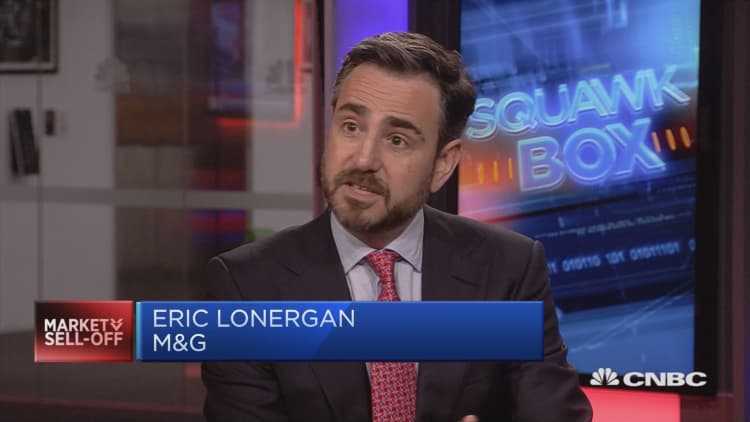
U.S. stocks may have seen their worst weekly performance in two years on Friday, but the current sell-off is just "noise" when compared to their recent gains, a fund manager told CNBC on Monday.
European equities were sharply lower on Monday morning continuing the current sell-off, but according to a fund manager this is just a pause for fresh air, as investors consider what to do with their portfolios.
"If you look at what markets have done year to date, frankly this is noise, this is not a very significant move whatsoever," Eric Lonergan, fund manager at M&G told CNBC Monday morning.
"If you're getting two years' worth of return in three to four weeks those are not sustainable price moves, so this kind of volatility is absolutely what you should anticipate as an investor," Lonergan added.
Equity markets have been on the rise for about a year hitting many all-time highs in that time. In mid-January, the Dow crossed the 26,000 benchmark for the first time just as the fourth-quarter earnings period began. The Dow and S&P 500 also registered their best monthly gains in January since March 2016 last month.
Nonetheless, the Dow saw on Friday its biggest one-day sell-off since June 2016. Market participants are adapting to an environment of strong growth and positive corporate results while concerns over low inflation creep in.
"One of the most interesting things that's happening at the moment is market participants have been premised on the fact that equity risk is about recession," Lonergan told CNBC, noting that Friday's sell-off has happened in an environment where the economy is doing "extremely well."
"The risk to markets currently is the discount rate, it's shifts in the cash rate, shifts in the bond yield. What's very important about that in a portfolio is you're exposed to equities. Into cyclically economic risk do you want to be long bonds or short bonds? And what the market at the moment is saying the way to diversify is actually to short the bond market," Lonergan said.
The bond market has seen rising yields as investors are increasingly concerned over inflation. The 10-year Treasury yield rose to 2.85 percent on Friday and the 30-year Treasury yield has passed the 3 percent benchmark on Thursday as traders believe that inflation might turn stronger than expected.
Rising yields are traditionally seen negative for stocks as they increase companies' borrowing costs.

Speaking to CNBC on Monday, Beat Wittmann, partner at Porta Advisors, said that we could see the Dow hitting the 30,000 benchmark.
"What is necessary, of course, is that the economy and the corporate earnings are continuing. I mean on a global level," he said.
Despite the ongoing sell-off in markets worldwide, Sonja Laud, head of equity at Fidelity International, believes that the most important question now is assessing whether the sell-off is initiating a change in trends.
"For the time being, I wouldn't read too much into it because, let's face it, the correction that we are seeing so far is not even in line with the medium correction we've seen since the 1980s, which is greater 10 percent," she said.
"I think what the big question mark will be is this a fundamental change in trend, i.e. if inflation were to really exceed the target of central banks, what does this mean for the economic cycle," she added.


